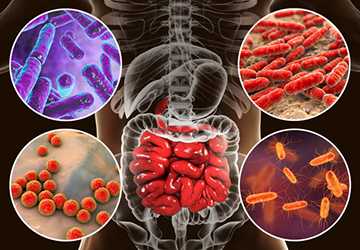What Science Reveals About the Connection Between Gut Health and Overall Well-Being
In recent years, scientific research has increasingly emphasized the profound impact of gut health on overall well-being. The intricate relationship between the gut and various aspects of physical and mental health has become a focal point of exploration for scientists and health enthusiasts alike. This comprehensive guide delves into the scientific insights that unveil the intricate connection between gut health and overall well-being.

Understanding the Gut Microbiota:
1. Microbial Ecosystem:
The gut is home to a complex ecosystem of microorganisms, collectively known as the gut microbiota. This community includes bacteria, viruses, fungi, and other organisms, and it plays a crucial role in maintaining the balance of the digestive system.
2. Diversity Matters:
The diversity of the gut microbiota is a critical factor in its functionality. A rich and diverse microbial environment contributes to efficient digestion, nutrient absorption, and protection against harmful pathogens. Imbalances in microbial diversity have been linked to various health issues.
Gut-Brain Axis:
1. Bidirectional Communication:
The gut communicates bidirectionally with the brain through the gut-brain axis. This complex network involves the central nervous system, the enteric nervous system (embedded in the gut wall), and the gut microbiota. Signals between the gut and the brain influence mood, emotions, and cognitive functions.
2. Neurotransmitter Production:
The gut microbiota produces neurotransmitters, such as serotonin and dopamine, vital for mood regulation. Alterations in the gut microbiota composition have been associated with conditions like depression, anxiety, and stress.
Immune System Modulation:
1. Guardians of Immunity:
The gut is a frontline defender of the immune system. The gut-associated lymphoid tissue (GALT) houses immune cells that monitor and respond to potential threats. A well-balanced gut microbiota contributes to the proper functioning of the immune system, defending against infections and diseases.
2. Inflammatory Balance:
Imbalances in the gut microbiota can lead to chronic inflammation linked to various health issues, including autoimmune conditions, metabolic disorders, and neurodegenerative diseases. A healthy gut microbiota helps maintain an appropriate inflammatory balance.
Digestive Health and Nutrient Absorption:
1. Optimal Digestion:
A diverse and balanced gut microbiota aids in the breakdown of complex carbohydrates, the synthesis of vitamins, and the absorption of nutrients. Proper digestion is essential for providing the body with the energy and building blocks needed for overall health.
2. Role of Short-Chain Fatty Acids (SCFAs):
Certain bacteria in the gut produce short-chain fatty acids (SCFAs) during the fermentation of dietary fibres. SCFAs have anti-inflammatory properties and play a crucial role in maintaining gut health. They also influence metabolic processes and contribute to overall well-being.

Metabolic Health:
1. Weight Regulation:
The gut microbiota influences metabolism and may play a role in weight regulation. Imbalances in the gut microbiota have been associated with conditions like obesity and metabolic syndrome. Understanding these connections offers potential avenues for managing metabolic health.
2. Energy Extraction from Food:
Specific bacteria in the gut contribute to the extraction of energy from food. Changes in the gut microbiota composition can affect how the body processes and stores calories, influencing overall energy balance.
Factors Influencing Gut Health:
1. Dietary Impact:
Diet is a primary factor influencing gut health. A diet rich in fibre, fruits, vegetables, and fermented foods promotes diverse and beneficial gut microbiota. On the contrary, diets high in processed foods and low in fibre may lead to microbial imbalances.
2. Antibiotic Use:
Antibiotics, while crucial for treating infections, can disrupt the balance of the gut microbiota. Overuse or misuse of antibiotics may lead to prolonged alterations in microbial composition, emphasizing the importance of responsible antibiotic use.
Lifestyle and Environmental Factors:
1. Stress and Mental Health:
Chronic stress can impact the gut-brain axis and alter the gut microbiota. The relationship between stress, mental health, and gut health underscores the holistic nature of well-being and the interconnectedness of various bodily systems.
2. Physical Activity:
Regular physical activity has been associated with a more diverse gut microbiota. Exercise contributes to overall health, and its positive effects on gut health further emphasize the multifaceted benefits of an active lifestyle.
Probiotics and Prebiotics:
1. Probiotics:
Probiotics are live microorganisms that confer health benefits when consumed in adequate amounts. Common probiotics include certain strains of bacteria and yeast. Incorporating probiotic-rich foods like yoghurt, kefir, sauerkraut, and kimchi can positively influence gut health.
2. Prebiotics:
Prebiotics are non-digestible fibres that promote the growth and activity of beneficial gut bacteria. Foods high in prebiotics include garlic, onions, leeks, bananas, and asparagus. Combining prebiotics with probiotics can enhance their effectiveness.
Promoting Gut Health for Overall Well-Being:
1. Diverse Diet:
Prioritize a diverse and nutrient-rich diet that includes a variety of fruits, vegetables, whole grains, lean proteins, and fermented foods. A colourful and varied plate supports microbial diversity and overall gut health.
2. Moderation in Antibiotic Use:
Use antibiotics judiciously, following medical advice and completing prescribed courses. Discuss concerns about potential impacts on gut health with healthcare providers, exploring strategies to support recovery after antibiotic use.
3. Stress Management:
Incorporate stress-reducing activities such as meditation, mindfulness, or regular exercise into your routine. Managing stress positively influences the gut-brain axis and contributes to overall mental and physical well-being.
4. Regular Physical Activity:
Engage in regular physical activity to support overall health, including gut health. Aim for cardiovascular exercise, strength training, and flexibility exercises for comprehensive well-being.
5. Proactive Lifestyle Choices:
Make proactive lifestyle choices that support gut health, such as staying hydrated, getting sufficient sleep, and avoiding excessive consumption of processed foods, added sugars, and alcohol.
Conclusion:
The scientific exploration of the gut-brain axis and the role of the gut microbiota in overall well-being underscores the interconnected nature of bodily systems. From immune function to mental health and metabolic regulation, the gut plays a pivotal role in maintaining balance and promoting health. By understanding the scientific connections between gut health and overall well-being, individuals can make informed lifestyle choices that support a flourishing and resilient body and mind.


